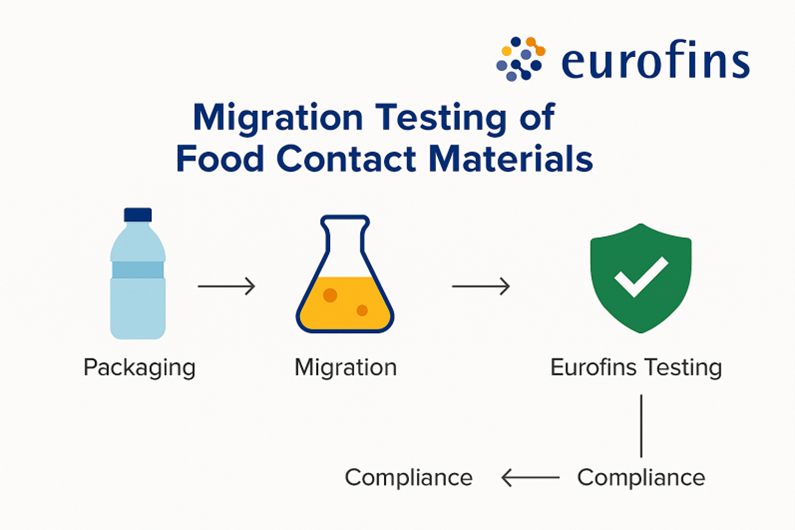Migration Testing of Food Contact Materials.

Introduction
Migration testing evaluates the transfer of chemical substances from food contact materials (FCMs) such as plastics, coatings, adhesives, inks, paper, and metal containers into food or food simulants. These migrating compounds may include monomers, plasticizers, stabilizers, additives, residual solvents, and contaminants, which can pose health risks if present above regulatory limits.
At Eurofins, we support manufacturers, suppliers, and retailers in ensuring that packaging materials comply with strict international food safety regulations.

Why Migration Occurs: Key Drivers
- High Temperatures (microwaving, hot filling, sterilization)
- Long Storage Durations (shelf-stable products)
- Food Composition (fatty, acidic, or alcoholic foods accelerate leaching)
- Material Porosity & Surface Area
These conditions can trigger the release of packaging components, making testing under simulated environments essential.
Types of Migration Testing We Offer
|
Type |
Description |
Common Targets |
|
Overall Migration (OM) |
Measures total non-volatile chemical release |
Total transfer of inert substances |
|
Specific Migration (SM) |
Detects individual, potentially hazardous substances |
Phthalates, BPA, styrene, heavy metals |
Materials We Test
- Plastics (PET, PE, PVC, PP, PS)
- Recycled Plastics (rPET, PCR materials)
- Laminates & Multilayer Films
- Coated Papers & Cardboards
- Metal & Glass Containers
- Ceramic Ware
- Eco-friendly & Biodegradable Packaging
Advanced Testing Technologies at Eurofins
|
Instrument |
Purpose |
|
GC-MS / GC-MS/MS |
Volatile substances, plasticizers, residual solvents |
|
HPLC |
Additives, antioxidants, monomers |
|
ICP-MS |
Heavy metal quantification |
|
FTIR / UV-Vis |
Functional group identification, screening tests |
Our NABL and ILAC-accredited labs ensure that all results are accurate, traceable, and internationally recognized.
Regulations and standards
FSSAI defines a "specific migration limit" as the maximum permitted amount of a given substance released from a material or article into food or food simulants. All plastic materials and articles intended to come into contact with food must not release substances in quantities exceeding the SMLs listed in the relevant tables of the regulations.
General Requirements:
- All packaging materials in direct or indirect contact with food must be of food-grade quality.
- Packaging materials must be suitable for the type of product, storage, and transportation conditions.
- Materials must withstand mechanical, chemical, or thermal stresses during normal use.
- Food products must be packed in clean, hygienic, and tamper-proof containers.
- Printing inks must conform to IS: 15495, and the printed surface must not directly contact food.
https://www.fssai.gov.in/upload/uploadfiles/files/Compendium_Packaging_V_%2002-04-2025.pdf
Plastic-Specific Regulations:
- Plastic containers and articles must comply with migration limits for various substances, including newly specified limits for antimony (0.04 mg/kg) and DEHP (1.5 mg/kg).
- Only plastics processed through FSSAI-approved recycling technologies are permitted in food packaging, and recycled plastics must meet strict migration limits to prevent contamination.
- Recycled PET (rPET) is allowed as a food contact material only if it passes stringent decontamination and testing protocols, with compliance to IS: 12252, IS: 9845, and IS: 9833, and must be tested in NABL/ILAC accredited labs.
Paper-Based FCMs:
- All paper-based food contact materials must be produced using virgin pulp, free from optical brightening agents, and must comply with migration limits for both direct and indirect contact.
Traceability and Labeling:
Packaging must clearly indicate the use of recycled materials and ensure product traceability, with specific marking and labeling requirements for recycled PET.
2025 Amendments:
The latest FSSAI Packaging Regulations (effective April 2025) emphasize the use of recycled plastics, provided they meet SMLs and are processed through approved methods. These changes aim to balance food safety with environmental sustainability.
https://www.fssai.gov.in/upload/uploadfiles/files/Compendium_Packaging_V_%2002-04-2025.pdf
Recycled PET Guidelines (May 2025):
New guidelines detail the acceptance criteria for using recycled PET in food contact materials, focusing on safety, process validation, and labeling for transparency
https://www.indialaw.in/blog/civil/fssai-recycle-pet-food-contact-material/
Migration testing standards and regulations play a crucial role in ensuring the safety and compliance of food contact materials (FCMs). Here are some key standards and regulations related to migration testing:
European Union (EU) Regulations
- European Framework Regulation (EC) No. 1935/2004: This regulation establishes general requirements for FCMs, including migration limits and safety criteria.
- European Plastic Regulation (EU) No. 10/2011: This regulation specifically addresses plastic FCMs, setting overall migration limits and specific migration limits for various substances.
Role of IS 9835 in Migration Testing
IS 9835 is the Indian Standard that outlines the methodology, conditions, and material safety requirements for plastic materials used in contact with food. It defines the use of food simulants, sets migration limits, and mandates performance checks for packaging materials under simulated usage conditions.
This standard is enforced under the FSSAI Packaging Regulations and ensures food safety from a packaging perspective.
How Our Testing Process Works
- Sample preparation based on defined surface-to-volume ratios
- Exposure to food simulants such as aqueous, acidic, alcoholic, or fatty liquids depending on food type
- Storage and testing under simulated real-life conditions of time and temperature
- Analysis using advanced chromatographic and spectrometric methods
- Reporting with compliance status and regulatory guidance
Who Needs Migration Testing?
- Packaging material manufacturers including plastics, laminates, coatings, inks
- Food and beverage companies introducing new packaging
- Retailers and exporters complying with EU, FDA, or FSSAI regulations
- E-commerce brands promoting sustainable or eco-friendly packaging
- Startups adopting biodegradable or recycled packaging solutions
Case Study: Ensuring Safe Baby Food Packaging
A baby food brand consulted Eurofins for testing polycarbonate jars suspected of BPA migration. LC-MS/MS results confirmed BPA levels above EU’s specific migration limit. With our guidance, the client switched to BPA-free materials and successfully launched products across EU markets with full compliance.
Why Choose Eurofins for Migration Testing?
- Global network of 900+ labs in 50+ countries
- Accredited under ISO/IEC 17025, NABL, FDA, and FSSAI
- Expertise in plastics, coatings, inks, adhesives, metals, and paper
- Fast-track turnaround time options (48h–5 days)
- End-to-end support including testing, compliance consulting, and supply-chain audits
- Ensure your food packaging is safe, compliant, and market-ready
- Contact Eurofins migration testing experts today for a consultation
Book migration testing services now: https://www.eurofins.in/food-testing/enquire-now/


